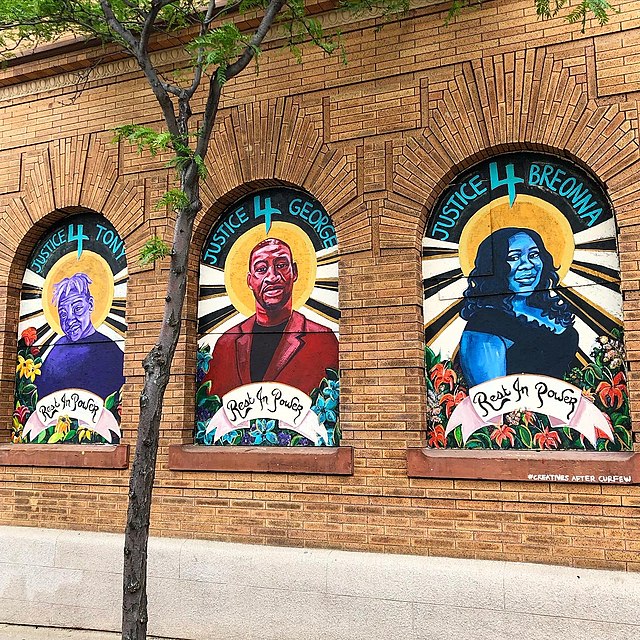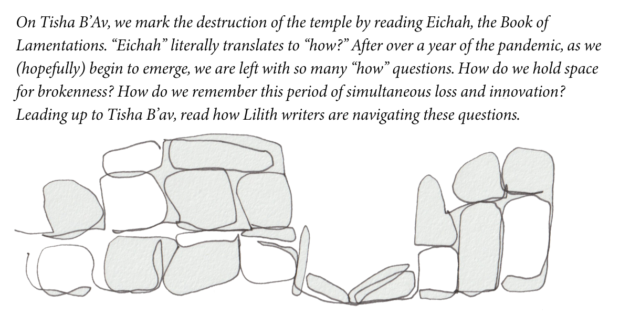
I Know Nothing About Tisha B’av

I know nothing about Tisha B’Av.
Not gonna lie, never heard of it.
But it wouldn’t be the only Jewish holiday I observed for the first time since Derek Chauvin murdered George Floyd.
So this holiday for me will always be somewhat about this question: How did the death of a Black man make me more Jewish?
This is a scary question, attached to a terrible story. But it has a purple lining (not a silver one).
I have connected and collaborated with more Jews of color and Black Jews than I ever dreamt was possible. But every time I receive an invitation there is a twinge in my body and I remember how we got here.
The story of what happened after the murder of George Floyd contains hope, but it’s bruised and it’s tiring. I hear that Tisha B’Av is about a terrible story, and that it’s told in a way that reveals some beauty.
I am a Black Jew and I am maybe more whole since a white Jewish majority started inviting me to share my art and myself in a way that it never had before. I have connected and collaborated with more Jews of color and Black Jews than I ever dreamt was possible. But every time I receive an invitation there is a twinge in my body and I remember how we got here.
I consider, sometimes delicately sometimes ragefully, “How do I accept this opportunity without accepting tokenization? How can I call out white supremacy without ostracization? Where were these people before the brutal murder of a man named George? Can they say, can they hold all the other names!? How long will this energy of inclusion last?”
I have absorbed both the shock of people’s ignorance, as well as the bliss of creativity and connection.
This is still a terrible story. One of many which could fit in a book of lamentations for this country we call America–one which adds to the laments of the world.
We are all bruised I think (and hope), by the fact that though the murder of George Floyd may have sparked guilt, compassion, connection and some action–this man is still dead.
Tisha B’av is a holiday about mourning. I often feel like I’m in a perpetual state of mourning.
So my question is, “how is this time different from the rest?”
On Tisha B’av, Jewish communities read Eicha, the Book of Lamentations. The very first line asks, “How is it that she sits alone?!”
Which…let’s stop right there.
First of all, how does the Book of Lamentations know that I’m sitting alone (currently on the outdoor patio of Lake Bomoseen Lodge and Taproom in Castleton, Vermont)?
I could tell you how I physically got here (drove from the summer camp I’m teaching at on my night off), but this “how” feels deeper. This “how” feels like it wants me to reflect on all the decisions that led to my being in both an external and inner isolation, and maybe it cries out to God saying, “how can I stand being alone!?”
My answer is: yes. I am alone, even in company.
Even in a more inclusive Jewish community, I am alone. Even post quarantine, I am isolated. Even with a better president, I grieve the destruction of the Black body (a temple). And even in love, I am in grief for the constant motion of the heart.
I am able to “stand it” because of a light in me, which guides me towards the next day, which sometimes feels new. Yes I am alone, and even alone I can mark small moments of beauty.
Rebecca S’manga Frank is a Black American Jew descendant from the Kingdom of Eswatini and Eastern Europe. She is a writer, actor, director, educator and filmmaker. Recently her work has been featured at the Jewish Theological Seminary, Society Theatre, JCC Manhattan, JCC Global, LABA New York (2021 Fellow), Elm Shakespeare Company, with Reboot for DAWN, and other artistic, religious, and/or cultural institutions.



